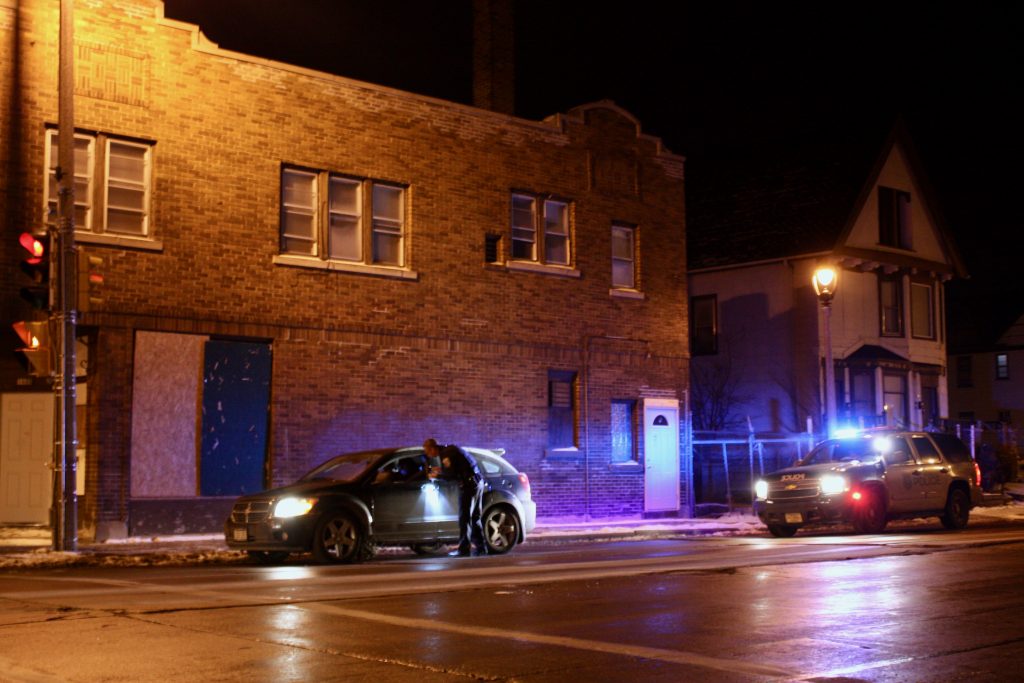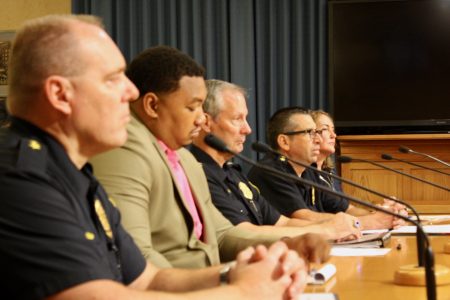ACLU Study Finds Racism By Police
About half of all traffic and pedestrian stops failed to show "reasonable suspicion.”

A Milwaukee Police Department officer pulls over a black resident near 35th and Clybourn streets. Photo by Jabril Faraj.
Community leaders are saying three reports recently released by the ACLU of Wisconsin vindicate members of the black community who have for decades protested the way police treated them.
An examination of Milwaukee Police Department (MPD) records of traffic stops, pedestrian stops, frisks and searches between 2010 and 2017 concluded that 350,000 of those stops — 48 percent of traffic stops and 59 percent of pedestrian stops — fail to show “articulable reasonable suspicion of criminal activity or a traffic or vehicle equipment violation.” The review was conducted by Margo Frasier, a criminal justice consultant and former police monitor and sheriff in Texas who was president of the Major County Sheriffs’ Association.
A separate report by David Abrams, a professor of law, business economics, and public policy at the University of Pennsylvania Law School, shows that Milwaukee police conduct more more than three times the number of stops in primarily black and Latino police districts as in white districts. Abrams also found that black and Latino drivers are more likely to be stopped, even in primarily white areas, and are more likely to be searched than white people, despite the fact that searches of white people more often result in discovery of drugs or weapons.
“That’s just the way that they police — they occupy these areas,” said Nate Hamilton, the brother of Dontre Hamilton, who was shot and killed by an officer in 2014. He added, “I feel like the black community’s being used for profit, when it’s all said and done,” citing high rates of incarceration for black men and the fact that poor residents are disproportionately ticketed.

(From left) Assistant Chief William Jessup, FPC Board Chair Steven DeVougas, former Chief Ed Flynn, now-departed Assistant Chief James Harpole and FPC Executive Director MaryNell Regan prepare to testify before the Common Council’s Steering and Rules Committee in September. Photo by Jabril Faraj.
“We knew this was part of (former MPD) Chief Flynn’s policing strategy, which we opposed,” said NAACP President Fred Royal, also a member of the Community Coalition for Quality Policing, an advocacy group that includes the ACLU. Royal said MPD has employed a “broken windows” strategy, which called for officers to preemptively stop people in high-crime areas for questioning “even if their home was in that geographical area.”
MPD’s standard operating procedure governing citizen contacts, field interviews, and search and seizure states an officer must be able to articulate facts that “lead a police member to reasonably believe that criminal activity has been, is being, or is about to be committed.”
In an email, MPD Sgt. Sheronda Grant wrote that during the first week of training, an internal affairs officer “instills the importance of following all guidelines set by the agency and thoroughly explains the agency’s Code of Conduct and Core Values” to recruits. Grant did not say whether MPD officers are tested on, or regularly reminded of, these standards.
The ACLU filed a class action suit early last year alleging that MPD’s stop practices are unconstitutional and racially discriminatory. The suit, which includes nine plaintiffs, is expected to go to trial in May.
ACLU of Wisconsin Legal Director Larry Dupuis said Frasier gave the police department some latitude in evaluating the stops. For example, if an officer documented he or she pulled someone over for a broken tail light, she considered this a sufficient reason for a stop. However, if the officer simply listed “loitering,” that would not be sufficient because “what is commonly thought of as loitering is not, itself, a crime.”
He also said it’s possible that, through court testimony of the officer involved, a particular incident could meet the standard. However, he added there are many stops that never would.
“Even if you went back and … asked every single officer, there’s a huge number of these stops that, under any scenario, are unjustified.”
Flynn defended MPD’s stop policies when the ACLU suit was announced, claiming that the department did not engage in stop-and-frisk because it avoided the “trap” of giving those searched a ticket, unlike in New York City where the practice was ruled unconstitutional in 2013.
The third report concluded not only that MPD maintained unconstitutional stop, frisk and search practices but also that the Fire and Police Commission (FPC), the civilian oversight board tasked with oversight of MPD, “has failed to adequately fulfill its official responsibilities.” The report was prepared by Samuel Walker, professor emeritus of criminal justice at the University of Nebraska and a respected criminal justice consultant,
Regan, who has served in the position since September 2015, did not respond to calls and voicemails requesting comment.
Jamaal Smith, racial justice coordinator for the YWCA of Southeast Wisconsin, said the FPC’s inability to provide adequate oversight is borne out by the data. “If you have 350,000 stop records that fail to show officers had reasonable suspicion, someone dropped the ball,” he said.
Smith said FPC commissioners should be required to undergo an orientation that includes basic information, such as police policies and procedures. Hamilton acknowledged the FPC does not have the resources or the information to be successful but said the body needs to be more bold.
Royal and Smith said that Mayor Tom Barrett, who appoints the commissioners, must be held accountable.
“You can’t keep just looking at the henchmen without looking at the top dog,” Smith said.
Ultimately, however, Hamilton said the responsibility falls to the people of Milwaukee to protect each other. He said individuals must become more knowledgeable about police procedure and policies so they can make specific complaints when those standards are violated. He also said onlookers or passersby must record interactions between citizens and police, adding that it will take people patiently and persistently putting pressure on Barrett, the FPC and interim MPD Chief Alfonso Morales to change the department’s practices.
Royal and Smith said it is essential for the department to implement problem-oriented community policing, and evaluate officers based on their problem-solving and relationship-building ability. Royal suggested giving residents a receipt of police interactions.
“We are people; we are human,” said Smith. “We have to also look at officers in that way as well. But the only way that will happen is if you see officers who are really trying to build (a relationship) with the community.”
This story was originally published by Milwaukee Neighborhood News Service, where you can find other stories reporting on eighteen city neighborhoods in Milwaukee.
Political Contributions Tracker
Displaying political contributions between people mentioned in this story. Learn more.
- May 25, 2017 - Tom Barrett received $500 from MaryNell Regan
- March 3, 2016 - Tom Barrett received $500 from MaryNell Regan





















Is there any actual data that neighborhood police patrols do anything, versus to just responding promptly to reported crime and doing detective work? It seems that these patrols principally exist to enforce some driving etiquette, but it would be much more efficient to just demand that the DPW build streets that are appropriate for the neighborhood context (2 laners instead of 4, shorter pedestrian crossings, safe parking lanes…).
What!? What a shock!? Wisconsin police arrest black people at a 10 to 1 rate of white people for cannabis yet use rates are the same! It’s called institutionalized racism, otherwise known as Wisconsin’s racist Jim Crow cannabis laws.
Dump Walker 2018
Dump ALL Republicans 2018
…then Free up the healing herb Wisconsin!
MPD and its officers need to be a part of the community, not employees who punch the clock and go home to their “safe” suburban home. We do not live in the Hollywood’s “Wild West.” Police should not be about getting the “bad guys.” The motto is “serve and protect” not “shoot ’em up and lock ’em up.”
Once we figure out that policing is about ensuring safety, then MPD and FPC will realize that these “special” interactions between officers and neighbors should be the rule; daily occurrences and not just for just for the media cameras.
I’m not sure why we needed another study about an issue that we know to be true–racial profiling by police and police misconduct continues unabated due to the lack of accountability. It is rampant in Milwaukee and across the country. Thank God for cell phones and the documentation by citizens of this misconduct. When the ‘code of silence’ is eliminated and the courts and police administration start to hold law enforcement to higher standards nothing will change. I think we are all tired of hearing ‘I was afraid for my life.’ That has turned into a rallying cry to get away with police overreach.
There needs to be major modifications in law enforcement training, racial and cultural sensitivity training and skill development in managing crisis situations in a variety of circumstances. Law enforcement administration and our oversight boards need to enforce disciplinary action for police that discourages racial profiling and holds each officer accountable.
I stand united with all of the individuals and families in Milwaukee who deserve better from our police officers. Times up on getting away with targeting individuals of color just because you can. We see you and we have had enough.